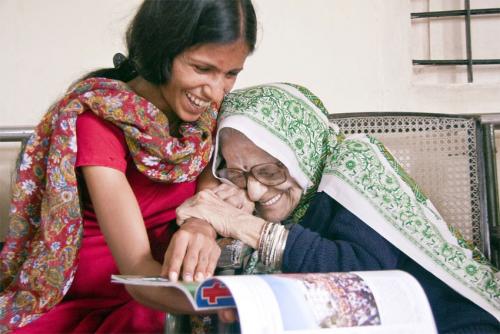UN health agency launches first global monitoring system for dementia
The United Nations health agency on Thursday launched the first global monitoring system for dementia, which is expected to affect 152 million people worldwide by 2050 – triple the current 50 million – amid the aging of the global population.

Ashwani, a caregiver at a centre in India, shares a laugh with Didi.
Dementia includes Alzheimer’s disease and other types of memory loss and cognitive disabilities.
“Nearly 10 million people develop dementia each year, six million of them in low- and middle-income countries,” said Tedros Adhanom Ghebreyesus, Director-General of the World Health Organization (WHO), in a news release.
“The suffering that results is enormous. This is an alarm call: we must pay greater attention to this growing challenge and ensure that all people living with dementia, wherever they live, get the care that they need,” he added.
The Global Dementia Observatory, a web-based platform, launched by WHO, can track progress on the provision of services for people with dementia and for those who care for them, both within countries and globally.
It will also monitor the presence of national policy and plans, risk reduction measures and infrastructure for providing care and treatment.
“This is the first global monitoring system for dementia that includes such a comprehensive range of data,” said Tarun Dua of WHO’s Department of Mental Health and Substance Abuse. “The system will not only enable us to track progress, but just as importantly, to identify areas where future efforts are most needed.”
WHO says the annual global cost of dementia is estimated at $818 billion, equivalent to more than one per cent of global gross domestic product. The total cost includes direct medical costs, social care and loss of income of caregivers.
By 2030, the cost is expected to more than double, to $2 trillion, a cost that could undermine social and economic development and overwhelm health and social services, including long-term care systems.
To date, WHO has collected data from 21 countries. By the end of 2018, it is expected that 50 countries will be contributing data.
Of the countries reporting data so far, 81 per cent have carried out a dementia awareness or risk reduction campaign, 71 per cent have a plan for dementia, 71 per cent provide support and training for caregivers and 66 per cent have a dementia-friendly initiative.
All of these activities are recommended by WHO in the Global action plan on the public health response to dementia 2017-2025.
The Plan provides a comprehensive blueprint for action that can be taken by policy-makers, health- and social-care providers, civil society organizations and people with dementia and their caregivers.
Source:United Nations
- 328 reads
Human Rights
Ringing FOWPAL’s Peace Bell for the World:Nobel Peace Prize Laureates’ Visions and Actions

Protecting the World’s Cultural Diversity for a Sustainable Future

The Peace Bell Resonates at the 27th Eurasian Economic Summit

Declaration of World Day of the Power of Hope Endorsed by People in 158 Nations

Puppet Show I International Friendship Day 2020

